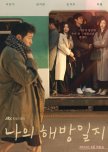As close to tangible human drama as Korean television can get
Transcending the fabric of the “television series” and entering my reality, if only for those sixteen episodes. That is My Liberation Notes, a drama work that understands the heart of any drama—dialogue. A drama, at minimum, needs two people to slide their hearts off of each other and in the modern “K-drama” discourse, it’s often expected that the two leads will fall in love, and embrace to the ballad of a beautiful pop song. In the words of a friend, every relationship is different; and to take from Tolstoy, while every relationship is different, every happy relationship is the same. Because it’s hard to be happy in a world sublimated by texts, social media, bureaucracy, and the pangs of dispriz'd love. While many of us seem to be doing well, most of us aren’t; and so Park Hae-young takes us through a brief period within the lives of Yeom Gi-jeong, Yeom Chang-hee, and Yeom Mi-jeong.
Park’s previous series, My Mister, was nothing short of a wonder and finishing it left me in a deep but empty void as I realized that I didn’t have someone whom I was willing to talk to, on a regular basis, about how hard living was. I’ve seen all but most of two episodes on the rewatch but have found it difficult to finish again. Four years later, Park brings this talk therapy to three people, or three “ones,” by placing them in a variety of sitting locations, episode after episode, simply—talking. About partway into the series I grew to miss Chang-hee’s ranting at life, at his co-worker, at not having a fancy car, at how he talks so much, and just listening. Gi-jeong I didn’t love a great amount, but she has her personality; and Mi-jeong, I will really miss—I do already—just listening. You really aren’t like many of us but watching you walk along the sidewalk at night, just talking, I heard a note. And that was the beginning of a song, a song that as we watch the birds fly above in the pink sky we hear them and see for ourselves that life is really just the same.
It's hard to be happy, and it’s really difficult to change; but life always brings moments of joy, and times when your heart thinks briefly of liberation.
Life is so hard, and that’s why I look at fiction’s great and immeasurable world for something better; for copium, essentially. I watch show after show, see movie after movie and find something to relate by as I return to my life and do I actually change? As a talking horse once said, you have to do it every day, and it’s really hard. But with these three working adult siblings who still live at home with their parents, after a time I didn’t think of it as fiction. I’m scared to look up the actors, although I will because I need more alternate universe Chang-hee and Mi-jeongs—it is a wonder to me how these real people can become others temporarily. With acting, you take on a personality and act, react, according to the situation but far more immersive, I think is how one lives out the other life, eats all those meals and drinks all those iced americanos. It’s a betrayal of that fictional curtain and almost feels tainted; that we have come to a point where fiction can feel so real and so grounded, to use a term conceived by a friend, whereby the movements and dialogue currencies of this work were just so natural, so organic that everything—and I mean everything—made sense. It’s not simple either. The series doesn’t even end on anywhere close to a satisfying “ending” because it’s not one. 16 episodes are the standard length for Korean television and so it ends there. If “change” is the primary language of fiction, how the several and many characters challenge it makes fiction its best. It’s even harder to do so in real life, but it didn’t even feel like Park did all he could to inhibit his characters from changing. He simply… wrote them as they were.
I can’t resist and have to quote one of the supporting characters at this moment:
“I once read a book to become a writer about how to be a good writer, and it said that a good drama is one where the main character tries hard to achieve something but can’t do it. So I gave up. Why would I write something that’s like life? It’s so boring.”
At its core, My Liberation Notes is about trying to be happy. Whether it comes from satisfaction with your career, finding love, or understanding your deepest issues. The best shows don’t motivate us to change. They tell us that the journey of life is hard, is harder like nothing else—but you really need to talk to those around you, and your heart just might ask every day what it means to live. You don’t have to answer it. But your heart moves all the same.
Park’s previous series, My Mister, was nothing short of a wonder and finishing it left me in a deep but empty void as I realized that I didn’t have someone whom I was willing to talk to, on a regular basis, about how hard living was. I’ve seen all but most of two episodes on the rewatch but have found it difficult to finish again. Four years later, Park brings this talk therapy to three people, or three “ones,” by placing them in a variety of sitting locations, episode after episode, simply—talking. About partway into the series I grew to miss Chang-hee’s ranting at life, at his co-worker, at not having a fancy car, at how he talks so much, and just listening. Gi-jeong I didn’t love a great amount, but she has her personality; and Mi-jeong, I will really miss—I do already—just listening. You really aren’t like many of us but watching you walk along the sidewalk at night, just talking, I heard a note. And that was the beginning of a song, a song that as we watch the birds fly above in the pink sky we hear them and see for ourselves that life is really just the same.
It's hard to be happy, and it’s really difficult to change; but life always brings moments of joy, and times when your heart thinks briefly of liberation.
Life is so hard, and that’s why I look at fiction’s great and immeasurable world for something better; for copium, essentially. I watch show after show, see movie after movie and find something to relate by as I return to my life and do I actually change? As a talking horse once said, you have to do it every day, and it’s really hard. But with these three working adult siblings who still live at home with their parents, after a time I didn’t think of it as fiction. I’m scared to look up the actors, although I will because I need more alternate universe Chang-hee and Mi-jeongs—it is a wonder to me how these real people can become others temporarily. With acting, you take on a personality and act, react, according to the situation but far more immersive, I think is how one lives out the other life, eats all those meals and drinks all those iced americanos. It’s a betrayal of that fictional curtain and almost feels tainted; that we have come to a point where fiction can feel so real and so grounded, to use a term conceived by a friend, whereby the movements and dialogue currencies of this work were just so natural, so organic that everything—and I mean everything—made sense. It’s not simple either. The series doesn’t even end on anywhere close to a satisfying “ending” because it’s not one. 16 episodes are the standard length for Korean television and so it ends there. If “change” is the primary language of fiction, how the several and many characters challenge it makes fiction its best. It’s even harder to do so in real life, but it didn’t even feel like Park did all he could to inhibit his characters from changing. He simply… wrote them as they were.
I can’t resist and have to quote one of the supporting characters at this moment:
“I once read a book to become a writer about how to be a good writer, and it said that a good drama is one where the main character tries hard to achieve something but can’t do it. So I gave up. Why would I write something that’s like life? It’s so boring.”
At its core, My Liberation Notes is about trying to be happy. Whether it comes from satisfaction with your career, finding love, or understanding your deepest issues. The best shows don’t motivate us to change. They tell us that the journey of life is hard, is harder like nothing else—but you really need to talk to those around you, and your heart just might ask every day what it means to live. You don’t have to answer it. But your heart moves all the same.
Esta resenha foi útil para você?







